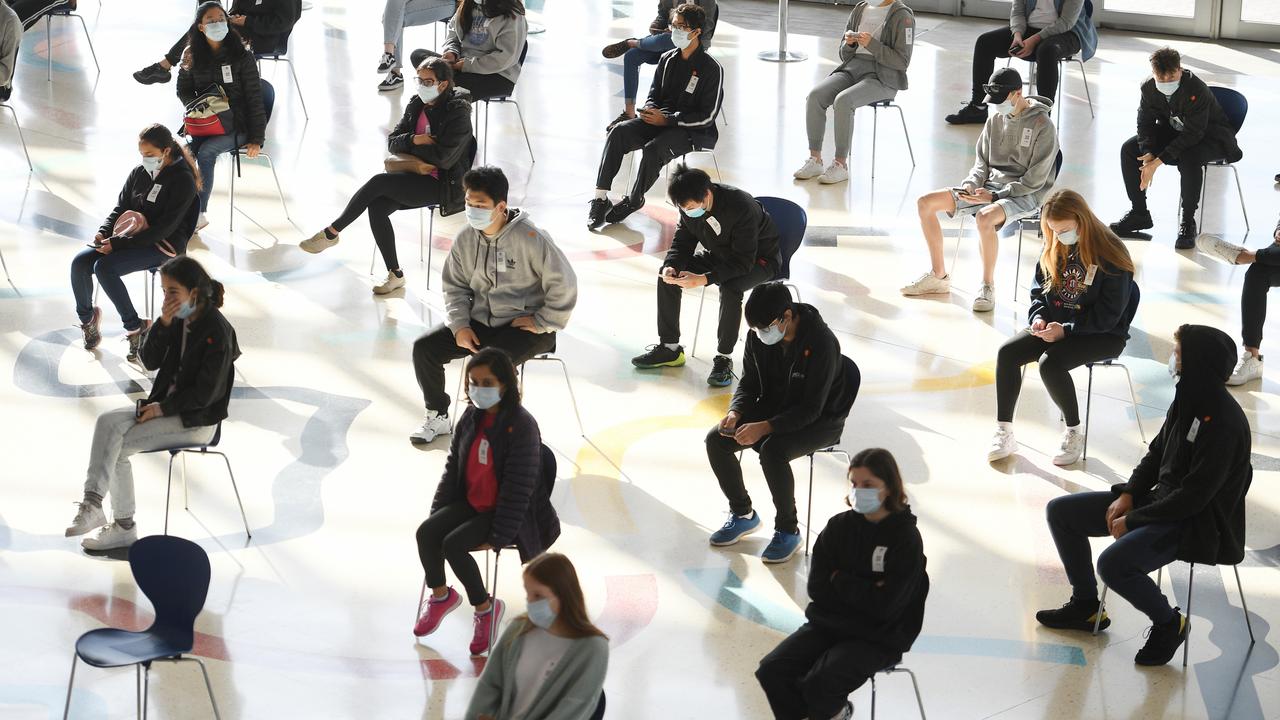Roadmap to vaccinate teens imminent
A roadmap to vaccinate teenagers will be finalised at Friday’s national cabinet meeting amid fears some students are falling behind after months of home learning.
A roadmap to vaccinate teenagers aged between 12 and 15 years will be finalised at Friday’s national cabinet meeting amid fears some students are falling behind after months of home learning.
But there’s a surprising answer to the question of whether home learning is damaging children’s educational outcomes according to the latest literacy and numeracy tests, which has found many students are still performing well, despite missing months of face-to-face learning in the classroom.
Education Minister Alan Tudge has confirmed that a national plan to roll out vaccines to teenagers will aim to vaccinate as many students as possible by the end of the year. The plan is to offer vaccinations at school where possible.
“I would certainly like to see the 12 to 16-year-olds vaccinated, and those plans are being worked up at the moment,” Mr Tudge said.
“They‘ll be finalised at the end of this week. You know, I’ve got two kids in that age bracket myself. So, certainly we want to see teachers vaccinated as well. Frankly, I want to see as many adults as possible vaccinated as quickly as possible.”
The vaccination of teenagers is regarded as a key step to returning children to school in lockdown states, with school clusters now emerging as one of the biggest drivers of cases in some regions, including the nation’s capital.
Prime Minister Scott Morrison has previously pledged that the approval of vaccine regulator ATAGI’s wasn’t “far away” and a state-based system for potential school-based vaccination programs was under consideration.
NSW chief health officer Dr Kerry Chant confirmed this month that she “firmly believed” NSW needed to vaccinate all 12 to 15-year-olds, once 16-year-olds had received doses.
“I believe in targeting school-aged children, in particular high school children, very quickly because we know they contribute to transmission,” she said.
But there’s still no vaccine approved for children aged five to 12 in the US, although other countries have either authorised vaccines for adolescents and young children or are considering them.
Which teenagers are eligible for Pfizer now?
Children aged between 12 to 15 years old with either specific medical conditions or those who identify as Aboriginal and Torres Strait Islander or live in a remote community have been able to receive a Pfizer-BioNTech Covid-19 vaccine since August 9.
But for most families, the main barrier is securing an appointment for a Pfizer vaccination. Many booking systems are still rejecting teenagers despite the fact some children are eligible.
The specified medical conditions that secure eligibility for Pfizer now are those that increase their risk of severe COVID-19, including severe asthma, diabetes, obesity, cardiac and circulatory congenital anomalies, neuro developmental disorders, epilepsy, immunocompromised and trisomy 21.
This group involves around 220,000 children aged between 12 to 15 years old who are eligible to receive the COVID-19 vaccine.
Health Minister Greg Hunt said approval for the use of Pfizer-BioNTech Covid-19 vaccines for the general population of children aged 12 to 15 is imminent.
“I would encourage all parents who have a child with a medical condition or are immunocompromised to bring them forward for vaccination. We want to ensure all Australians are protected from Covid-19, including the most vulnerable in our community,” he said.
What is the approval process for all 12 to 15-year-olds?
There’s a two-stage process to approve the vaccine for younger age groups. First, the Therapeutic Goods Administration needs to approve the vaccine for the age group.
The Australian Technical Advisory Group on Immunisation (ATAGI) then needs to review its use in the specified age group.
Surprise NAPLAN results suggest kids are doing OK
There’s growing fears that the impact of lockdowns is creating a generation of children who are falling behind in educational outcomes.
But there’s mixed results according to the latest NAPLAN figures tracking children in the nationwide literacy and numeracy assessment.
The new figures confirm the Covid-19 pandemic did not significantly impact student achievement at a national or state and territory level, with average scores largely unchanged from 2019.
“It is certainly a relief that we have not yet seen the significant declines that we may have expected due to school closures, particularly in Victoria,” Minister Tudge said.
“The results also show a resilience among young Australians and they are testament to the hard work of teachers and parents who are supporting learning at home.
“I remain very concerned about the ongoing impact of school closures on young people and their families, particularly the mental health impacts.
“I am also concerned that some individual families have really struggled with schooling and may have disengaged altogether.”
Education experts say more work needs to be done to dig into the numbers to work out if some disadvantaged children with less access to devices and the support at home have been adversely affected even if the overall results are being maintained despite school closures.
For all the latest lifestyle News Click Here

